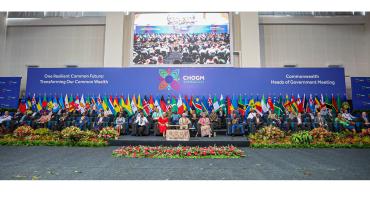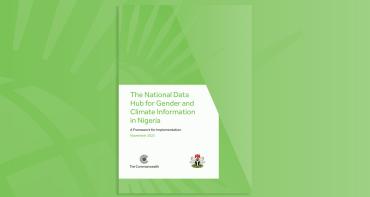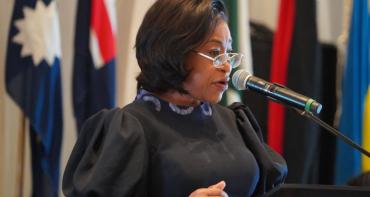Female genital cutting (FGC) is one of the more hidden, yet wide reaching, barriers to the empowerment of women and girls in at least 45 countries all over the world. It intersects with a variety of other issues.
FGC is often, but not always, a precursor for child marriage. It also impedes economic empowerment, education, lifelong health (both physical and psychological), and can mean women and girls’ are hindered from fully contributing to the development and prosperity of their countries.
It is clear that supporting the movement to end an issue that can be so devastating to the life of a girl, a woman, would be beneficial to any country where the practice continues.
Around the Commonwealth, parents in many communities chose to cut their daughters because they believe it is the right thing to do for social acceptance and for their child’s future.It is a social norm that is held in place by an entire community, and it impacts at least 200 million women and girls globally. Between 2015 and 2030, UNICEF and UNFPA estimate that 68 million girls will be cut unless progress is accelerated.
Latest statistics from Nigeria, 20 million girls and women had undergone FGC, accounting for 10% of the global total.
Statistics:
Some of these prevalence rates are decreasing, and while many of these statistics appear low on a national scale, in some ethnic groups in a country where FGC rates are decreasing, prevalence can still be high. For example in Kenya, national prevalence has decreased from 24% to 21% in recent years, but in the Kurian ethnic group, FGC prevalence is as high as 96%. We also know that just under half of girls in Indonesia undergo FGC, and the practice continues in countries around the world that do not yet report national data, so the true global picture is not yet complete.
This week Orchid Project is joined by our partner in India, Aarefa Johari, co-founder of Sahiyo, which is working to end FGC within the Dawoodi Bohra and South Asian communities. Aarefa raises awareness on how FGC has affected her life, but also how change can happen, and how girls and women impacted by the practice can lead empowered lives as well as looking forward to a future generation living free from FGC.
This vision is entirely possible within a generation.
Aarefa’s storyAarefa Johari was just seven when a part of her clitoris was cut, so her memories of the incident are hazy. She remembers she was with her mother, in her home city of Mumbai, India, visiting the bustling Dawoodi Bohra neighbourhood but the reason for going was not clear. She remembers entering the home of an unfamiliar Auntie, and being told to lie on the floor with her frock raised and her panties off. She didn't understand why they were spreading her legs apart and holding her tight, but she remembers her mother's reassuring words: "Don't worry, this will only hurt a little bit....it'll be over in a minute…" It did hurt, and Aarefa cried. Was there blood? She doesn't remember. That pain lasted for about a day and soon the memory faded. She grew up with the knowledge that this practice - "khatna" - was done to all little girls and boys in her Dawoodi Bohra community. It wasn't until she started college that those memories surfaced again in a rush of rage and indignation when she read about female genital cutting (FGC) and finally understood what she had been subjected to. Aarefa's outrage and feelings of being violated have fuelled most of her activism in the past six years. She is now the co-founder of Sahiyo, an international collective working to end Female Genital Cutting among the Dawoodi Bohra and other Asian communities, through education, dialogue and community engagement. Through her work, she hopes to help build a world where women's bodies, consent and agency are valued and their sexuality is not feared or repressed. Aarefa said: "In my culture, women are not supposed to talk about their genitals in public. And yet, my culture thought it appropriate to slice off a part of my genitals, when I was too young to protest or even know what a clitoris is. A part of me has been taken away forever, in the name of tradition, of faith and incredulous ideas of 'purity'. I can never get back what I lost, but I can use my voice to speak out, so that future generations of girls are not altered and violated for the sake of oppressive social norms. I have been speaking out for six years, and the most rewarding part of my work is to see young mothers and fathers promise they will not cut their daughters anymore. Every voice counts." |
Empowered future for girls
In Kenya, where another of Orchid Project’s partners is joining us for CHOGM 2018, Dr Carolyne Odula, Board Chair of the Coalition on Violence Against Women (COVAW), communities are coming together, sometimes for the first time, and they’re speaking openly about FGC, which has long been a taboo subject. In the Maasai community of the Loita Hills, South Kenya, 33% of girls are now going through an alternative rite of passage, and graduating into womanhood while remaining uncut due to the work of SAFE Maa. This percentage is only going to grow.
Outside the Commonwealth, Orchid Project’s partner in Senegal, Tostan, has been a pioneer in empowering communities to abandon harmful practices through a holistic approach, and thousands of communities in West Africa have publicly declared that they are leaving FGC behind. This inspirational, community-led movement is showing that it is possible for FGC to end, however it doesn’t happen overnight, and communities cannot do it alone. To shift a social norm like FGC, communities must have the space to talk openly, and this must be facilitated in a non-judgemental way and as part of a holistic approach. When communities are empowered in this way to lead their own futures, this is when change happens.
For the global community, around the Commonwealth and beyond, this change presents an opportunity to create an empowered future for girls and women that is free from FGC. Governments must come together and support the movement through effective policies and frameworks, by building up evidence and research, including increased reporting on the Sustainable Development Goal 5.3 indicator which relates to harmful practices, and recognising that FGC is a global issue, but one that can end.
We need to see strong commitment translated into action across international, national and regional stakeholders, and most importantly, we need to support approaches that allow communities to decide for themselves to abandon FGC, for the empowerment of their societies and for the futures of their women and girls.
Julia Lalla-Maharajh is the CEO and Founder of Orchid Project, a charity with a vision of a world free from female genital cutting (FGC).



